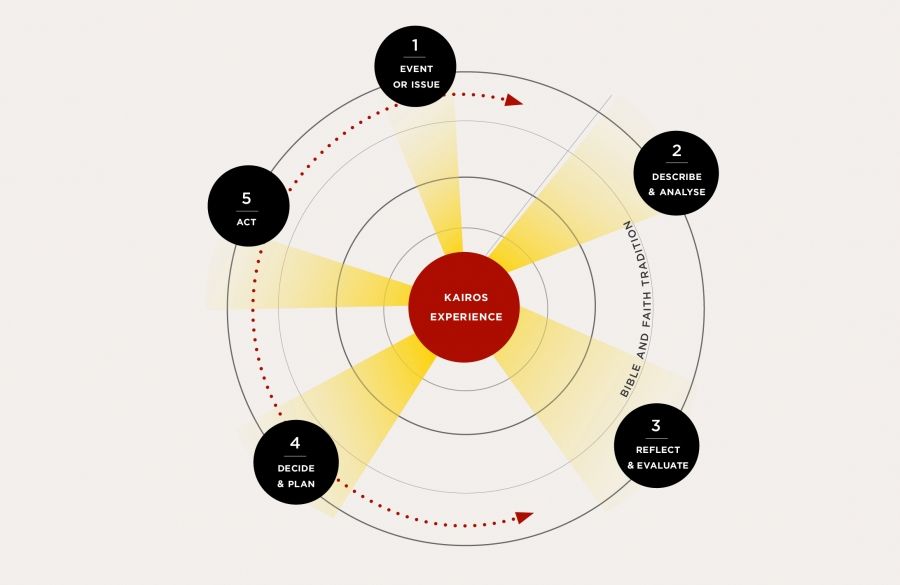A way forward

A way forward
21 February 2018
Faith-based facilitation is helping Salvationists find a way forward together in an increasingly complex world. Photo Riccardo Annandale.
An increasing number of Salvation Army officers, personnel and centres are adopting a model called Faith-Based Facilitation to work through sensitive situations.
Scenario one:
The youth at a local Salvation Army corps in a large city noticed that there were commercial sex workers hanging around the corps building most nights. They observed that some of the girls were their age or even younger, and felt concerned for their wellbeing. They approached the corps officer about helping in some way. How could the corps officer navigate this situation: honouring the young people’s desire to minister; determining whether it was appropriate for involvement by the Salvation Army; engaging the wider corps as needed; keeping the young people safe?
Scenario two:
There was unhappiness within the Salvation Army corps. There were rumours that Mr Stephen, who had joined the corps recently, was “misusing” his membership and threatening to leave the corps if he wasn’t given financial help. His wife was a Muslim and, according to rumours, he intended joining her at the mosque if the Salvation Army didn’t help him. These rumours gave rise to anger and frustration among corps members with some threatening to take the matter to the police. What would be an effective way of working through this emotive situation, taking on board the well-being of the new member as well as acknowledging the corps members’ concerns?
Both of these scenarios were real-life situations and a process called Faith-Based Facilitation was used with good effect to discover a way forward. Faith-Based Facilitation (FBF) is a way of helping people think, talk, explore and respond to their issues in the light of their faith. It is a process that has wide application, from dealing with practical problems such as health and emergency services, through to dealing with complex issues such as community development and social problems.
It can also be used when Salvationists within a corps strongly disagree on their understanding of what the Bible says about a particular topic, or disagree about an appropriate Salvation Army response to an issue in society. Along with an effective outcome plan, another result of the FBF process is that healthier communities enjoying deeper relationships develop.
FBF is not a new idea, a theory or a project, but is a way of working and interacting that needs to become a habit. Recently, the Salvation Army’s International Headquarters again endorsed the FBF process, with General André Cox, the world leader of the Army, choosing this model as the preferred way to engage in conversation around all manner of issues.
Members of the Army’s International Theological Council, the International Moral and Social Issues Council and the International Social Justice Commission were trained in FBF in late 2016. This was in preparation for the Army’s International Conference of Leaders
held in November 2017, where some FBF cycles were experienced by territorial leaders. The FBF facilitators trained in London have now become a resource for their respective territories to use as needed.
FIVE-STEP CYCLE OF FAITH-BASED FACILITATION
So what does FBF entail? Briefly, the process of FBF entails a “cycle” that consists of five steps. A group comes together to have a safe conversation about a specific event or issue they want to resolve. They then work their way through the cycle. 
1. Event or issue: Define the issue and clarify what is being discussed. As a group, they decide the boundaries of discussion. Understanding and meaning of words are checked so there is a consensus in the group.
2. Describe and analyse: Unpack and explore the issue thoroughly. Build a deep and comprehensive understanding together.
3. Reflect and evaluate: Step back and reflect. Bible, tradition and culture are considered – along with the opportunity for prayer and reflection.
This is potentially where a Kairos moment may occur (noted in the inner part of the accompanying graphic). This could be described as a “light bulb” moment, a time where we listen to allow God’s voice to become clear – maybe with new understanding or a new direction. This does not always occur, but it is important that space is given so God has an opportunity to be heard.
4. Decide and plan: What can we do about it? This is where consensus can be reached about decisions the group can own and put into practice.
5. Act: This may or may not be relevant, depending on the issue or topic. However, translating decisions into action is most vital. The conversation, deepening relationships and decisions made, need to impact the way we live. A good question here is, “In the light of this experience, how then shall we live?”
The Faith-Based Facilitation process does not necessarily stop after one cycle, but as new or connected issues are identified a new cycle can commence and the conversation restarted.
For further information, please contact Lieut-Colonel Donna Evans. Additional information, studies and tools can be downloaded from www.salvationarmy.org/fbf